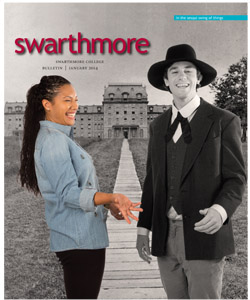‘Remaking College’ Paves New Ground for Liberal Arts
When President Rebecca Chopp collaborated with Daniel Weiss, president of Haverford College, in April 2012 to stage the conference The Future of the Liberal Arts College in America and Its Leadership Role in Education Around the World, their expectations for attendance were somewhat modest. The friends and colleagues were mildly (and pleasantly) surprised when more than 200 college presidents, faculty members, students, and board members from around the country attended. The conference also generated considerable media buzz in higher-ed circles, contributing to the dialogue about the future of liberal arts institutions and the significance of their role in democratic cultures. The 2012 conference clarified that the issues facing higher education—and liberal arts in particular—are urgent ones.
The presentations at the 2012 event, held at Lafayette College, also revealed the extent to which liberal arts educational leaders have responded both cohesively and creatively to the challenges confronting them. In fact, the presentations were so compelling that Chopp, Weiss, and higher-education consultant Susan Frost, at the urging of many attendees, compiled the presentations into a book. Remaking College: Innovation and the Liberal Arts, published by Johns Hopkins University Press, was released in December.
Says President Chopp, “This book captures the truly provocative, imaginative thinking higher-ed leaders all over the country are already doing, and I’m confident it will be a springboard for future progress.” She states in the book’s preface, “Those of us who work as presidents and other leaders at liberal arts colleges recognize the importance of this moment in higher education, and we understand the power of a strong foundation in the liberal arts for transforming people and communities.”
Among the institutions represented by the book’s contributors are Bryn Mawr, Colorado College, Franklin & Marshall, Lafayette, Macalester, Pomona, Princeton, Smith, The University of the South, Vassar, Wheaton, and Williams. Essayists address a wide array of challenges confronting higher education, including cost, governance, technology, and changing student demographics. In addition to her editorial role, President Chopp authored the chapter, “Remaking, Renewing, Reimagining: The Liberal Arts College Takes Advantage of Change.”
Suzanne Welsh, Swarthmore’s vice president for finance and treasurer, also contributed a chapter on economics and affordability.
As with the recent establishment of the College’s Institute for the Liberal Arts, Remaking College solidifies the leadership role Swarthmore College plays in higher education, in general, and President Chopp’s status as a passionate spokesperson for the cause of liberal arts education, in particular. On April 1, alumni will have the opportunity to interact with Chopp and Weiss at a joint Swarthmore-Haverford event in Philadelphia.
Listen to Chopp and Weiss discuss their book here
 Email This Page
Email This Page